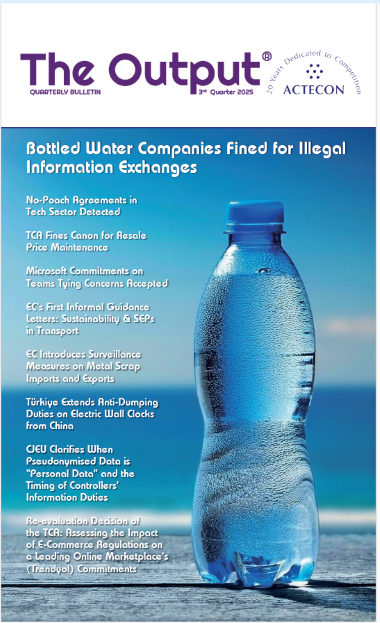TCA Reveals Detailed Reasoning of Hefty Fine on Nestle Due to Vertical Restraints
| Competition Law

Article By Caner K. Çeşit, Alper Karafil, Şamil Emirhan and Burçe E. Göçer
Introduction
On 16.12.2024, the Turkish Competition Authority’s (“TCA”) reasoned decision imposing an administrative fine of TRY 346,911,505.44 (approx. EUR 10.4 million)1 on Nestle Türkiye Gıda Sanayi A.Ş. (“Nestle”) was published on the TCA’s official website2.
For the background information, the TCA had initiated a full-fledged investigation on 15.12.2022 into Nestle regarding the allegations that the undertaking violated Article 4 of the Law No. 4054 on the Protection of Competition (“Competition Law”) by means of (i) determining the resale prices of its distributors (“RPM”) and (ii) imposing region and customer restrictions to its distributors3. In line with the case team’s assessments, the TCA decided that Nestle violated Article 4 of the Competition Law via these vertical restraints.
The TCA’s justifications and approach to Nestle’s practices based on the findings had remained hidden until the publication of the reasoned decision, which will be discussed in this article.
Assessments of RPM
Nestle argued that it does not intervene in resale prices of its distributors through pressure, incentive, or coercion and that the prices mentioned in the seized findings were not applied as found during the investigation.
On the other hand, the TCA assessed that the findings established that Nestle, directly and indirectly, determined the resales prices of its resellers, which is accepted as per se violation regardless of its effect on the market:
― In Finding-1 (Nestle’s internal correspondence), it is understood from the phrases “Duyça will sell the goods to Promas at its old purchase price by putting 8% profit. Promas will give 45 days postdated cheque.”, “I have set the sale price of the product from Promas as 24.70.” and “Please talk to your distributors and seal the issue.” that Nestle’s managers instructed Nestle employees to directly intervene in the resale prices of Duyça and Promas, which are the distributors of Nestle. Upon this correspondence, one Nestle employee realised that this might not be in compliance with the Competition Law and informed the relevant internal departments.
― In Finding-2, it was seen that the correspondences in Finding-1 were forwarded to an independent audit firm by Nestle and complained that Nestle determined the resale prices as well as the purchase prices of the distributors. From the phrases “Duyça Margin”, “Promas Sales”, “Duyça Discount”, “Sales Price” and “Promas Margin” in the Excel table, it was assessed that Nestle determined the discount rates to be applied to Promas and Duyça’s resellers. It was found that Duyça complied with the prices in the table; on the other hand, Promas did not.
― In Finding-3 (Nestle internal correspondence), the phrase “They must not go below the list price” indicated that Nestle tried to make the resellers implement the “minimum sales prices”. When the TCA evaluated the sales of coffee machines during the relevant period, it was seen that Doğaner -Nestle distributor- did not sell at a price lower than Nestle’s list price in 8 out of the 21 sales.
― In Finding-4, it is understood from the phrase “Do not go below the sales price I said in these products brother, let’s not disrupt the market” that Nestle imposed the list prices as minimum resale prices of its resellers and the relevant correspondence indicated Nestle’s intention to determine the resale prices of its resellers.
― In Finding-5, the phrase “do not apply additional discount above that and other customers” sent by Nestle to Duyça, along with the discount rates to be applied, showed that Nestle determined Duyça’s resale price.
― In Finding-20, the message sent by Nestle’s distributor to its customer “I really can’t, I used 10% of my 12%, also Nestle intervenes in the discounts more than 10%.”, indicated that Nestle tracked the discount rates applied by the distributors and that the distributors are concerned about Nestle’s intervention in case of non-compliance. Moreover, Panorama system, which enables Nestle to track the resale prices of its resellers and discount rates, facilitates such intervention.
― In Finding-21, the phrases “[…Hotel operators…] Write the discounts written in the attached table when invoicing.” and “5% in the distributor discount column, the discount to be written in the Nestle discount column is also attached.” in the e-mail message sent by Nestle to Kaşpa -Nestle distributor- indicated that Nestle determined the discount rates to be applied by its resellers. According to the TCA’s assessment, Nestle tried to enforce the minimum sales price of the resellers, and resellers mostly complied with the prices dictated by Neste. Moreover, Nestle determined discount rates to be applied by its resellers and their profit margin.
Assessments of Region/Customer Restrictions
When Nestle’s agreements conducted with its distributors were examined, it was determined that the agreements do not contain legitimate territorial exclusivity clauses, although in practice, they may act as if there is an exclusivity clause, as also accepted by Nestle during the oral hearing session.
It was found that the distributors’ customers were determined by Nestle and categorised as red, yellow and green. It was understood based on this categorization that;
― in case a distributor sells products to a red customer, Nestle will not cover the discount applied by distributor to the customer,
― in case a distributor sells products to a green customer, Nestle will cover the discount applied by distributor to the customer, and
― in case a distributor sells products to a yellow customer, whether Nestle will cover the discount or not will be decided by considering the category and volume of the sale.
It was assessed that the restrictions on sales to the said customer categories were covered both active and passive sales. Predictably, the other findings revealed that Nestle restricted passive sales of its distributors as well as active sales.
Assessments of Sales Tracking System
The TCA emphasised that Panorama system which is used by Nestle facilitated the intervention to the prices and discount rates. During the investigation, one of the complainants claimed that the Panorama system -which is a field sales programme that Nestle’s distributors are obliged to use- does not allow inserting prices and discount rates other than the ones determined by Nestle, and the distributorship agreements are terminated in case of any objections. Although Nestle argued that these allegations were merely accusatory, the TCA rejected Nestle’s defence by considering that its conclusion based on evaluation of the findings as a whole.
Even though some of the distributors stated that Nestle does not intervene in the resale prices or regions/customers, the TCA assessed that the fact that not intervening in the sales practices of some distributors does not justify the infringement finding. Therefore, it is understood that the allegations regarding Panorama system were considered in the TCA’s final conclusion.
The use of sales tracking systems should be handled delicately since they can be deemed as a “two-sided sword” in terms of competition law. While the TCA’s rather backdated precedents were noting that tracking the resellers’ sales is not a violation by itself, it is seen in the TCA’s recent decisions that sales tracking can be deemed as supplementary evidence when evaluated with other findings together.
Assessments of Nestle’s Request to Offer Commitments
Nestle requested to offer commitments to the TCA regarding the allegations of region and customer restrictions. However, the TCA rejected this request because (i) the allegations concern RPM and restricting both active and passive sales of the distributors, (ii) the commitments should not be accepted since RPM is a naked and hard-core infringement, and (iii) expected procedural benefits would not be achieved through adopting the commitment mechanism only for a part of the competition issues subject to case.
The TCA’s rejection of Nestle’s commitments regarding sales restrictions is one of the most significant aspects of this investigation, since TCA’s tendency on its precedents is often to accept the commitments offered by the undertakings in the investigations regarding sales restrictions. It is known that the TCA may separate its conclusions in the vertical investigations into two, for RPM allegations and sales restrictions, and accept commitments for the sales restrictions and settle for RPM4.This approach can be understood as the TCA is willing to separate the investigations for procedural economy when it is possible to implement commitment and settlement mechanisms simultaneously.
Conclusion
Overall, the TCA’s much-awaited reasoned decision was remarkable as it clarified the reasoning for imposing a single fine of TRY 346,911,505.44 (approx. EUR 10.4 million) on Nestle for both RPM and sales restrictions. Most importantly, the decision revealed that the TCA’s rejection of Nestle’s commitments regarding sales restrictions was based on the procedural benefits.
The decision provides significant insights regarding the usage of sales tracking systems for the undertakings, such as Panorama system used by Nestle. The TCA’s precedents establish that the mere usage of sales tracking systems does not constitute a violation in the absence of supplementary evidence regarding the intervention in resale prices and/or regions/customers. However, the usage of such systems will highly likely to be considered as supportive evidence when there are other correspondences revealing the undertaking’s intervention.
1 In the calculation of the administrative fine in terms of EUR, the average buying rate of exchange of the Central Bank of Turkey for 21.02.2024, which is the date of announcement of the short-form decision, was taken into consideration as the rate of exchange. For 21.02.2024, this rate was EUR 1 = TRY 33.39.
2 The TCA’s decision dated 15.02.2024 and numbered 24-08/149-61.
3 The TCA’s announcement regarding the initiation of the investigation is available in English here.
4 Please see the TCA’s Singer decisions (09.09.2021, 21-42/614-301; 30.09.2021, 21-46/672-336), Pierre Fabre decisions (23.02.2023, 23-10/175-43; 09.03.2023, 23-13/214-70), Duracell decisions (08.02.2024, 24-07/117-49; 04.04.2024, 24- 16/359-139), and Oriflame decisions (14.03.2024, 24-13/245-102; 14.03.2024, 24-13/246-103).







